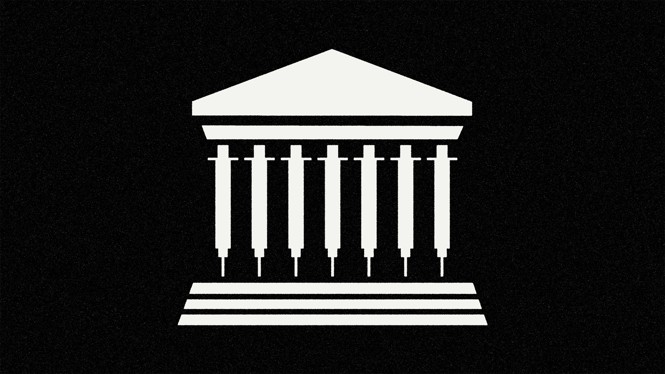Every weekday evening, our editors guide you through the biggest stories of the day, help you discover new ideas, and surprise you with moments of delight. Subscribe to get this delivered to your inbox.

Today, the Supreme Court ruled against Biden’s vaccine-or-test mandate for large businesses. It did, however, uphold the corresponding mandate for health-care workers.
The president announced the pair of controversial mandates this fall amid frustrations about the country’s lagging vaccination rate and a Delta-led surge in cases. Four months and a whole new variant later, many Americans remain stuck in a familiar pandemic limbo, and even some liberals are tempted to give up at this point .
Mandates, some hoped last year, could help the United States win back some normalcy. That won’t be the case, the Court made clear today.
So what now?
What this means for our fight against the coronavirus …
“If we can’t get our vaccination rate up, we’re basically waiting for everyone who still has no immunity to COVID to get infected instead,” our science and health reporter Sarah Zhang told me. “That’ll likely happen soon, given how fast Omicron is now spreading.”
“The U.S. gets to endemicity when essentially everyone has some immunity to the virus, so either vaccination or infection would get us there. But vaccines would get us there with a lot less death and a lot less misery.”
And for the future of the federal government …
The Court’s ruling could, in theory, prompt a dismantling of the federal government, the law professor Kimberly Wehle warned last week.
“If Congress is hindered in its ability to employ agencies to fill in the details of its broad mandates, life in the United States could change dramatically,” she wrote. “Agencies make rules and regulations affecting stock markets, consumer-product safety, the use and trafficking of firearms, environmental protection, workplace discrimination, agriculture, aviation, radio and television communications, financial institutions, federal elections, natural gas and electricity, the construction and maintenance of highways, imports and exports, human and veterinary drugs, and even the licensing and inspection of nuclear-power plants.”

The rest of the news in three sentences:
(1) Senator Kyrsten Sinema reaffirmed her support for the filibuster, putting the future of voting-rights legislation in doubt.
(2) The Justice Department charged the leader of the Oath Keepers, Stewart Rhodes, with seditious conspiracy tied to the January 6 attack.
(3) Buckingham Palace stripped Prince Andrew of his military titles as he faces a sexual-abuse lawsuit.
Today’s Atlantic-approved activity:
Plan your year in TV watching. Shirley Li highlights more than two dozen new projects and returning favorites to look out for in 2022.
A break from the news:
Why is it so hard to make new friends in midlife?
Every weekday evening, our editors guide you through the biggest stories of the day, help you discover new ideas, and surprise you with moments of delight. Subscribe to get this delivered to your inbox.



